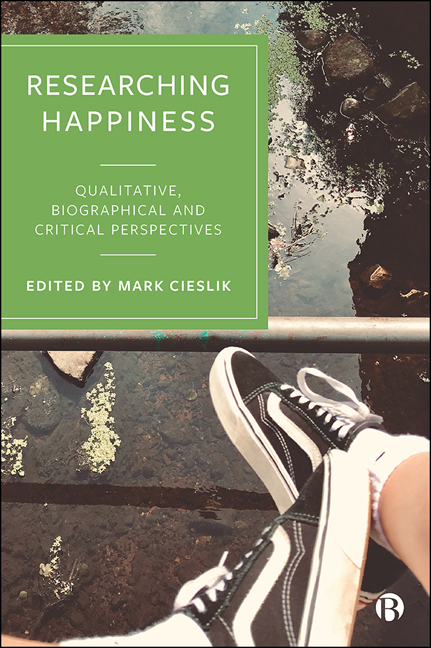Book contents
- Frontmatter
- Contents
- List of Figures and Tables
- Notes on Authors
- 1 Introduction: Developing Qualitative Research into Happiness and Wellbeing
- Part I Qualitative Research into Happiness/Wellbeing: Theories, Debates and Issues
- Part II Qualitative Research into Happiness/Wellbeing: Communities, Biographies and Identities
- Part III Qualitative Research into Happiness/Wellbeing: Methodological Innovations
- Index
7 - How Cultural Heritage can Contribute to Community Development and Wellbeing
Published online by Cambridge University Press: 22 December 2021
- Frontmatter
- Contents
- List of Figures and Tables
- Notes on Authors
- 1 Introduction: Developing Qualitative Research into Happiness and Wellbeing
- Part I Qualitative Research into Happiness/Wellbeing: Theories, Debates and Issues
- Part II Qualitative Research into Happiness/Wellbeing: Communities, Biographies and Identities
- Part III Qualitative Research into Happiness/Wellbeing: Methodological Innovations
- Index
Summary
Introduction
Community wellbeing as an element of happiness research is a rather nebulous concept because first of all it is not clear how collective wellbeing amounts to more than the individual wellbeing of its members and second because it is not clear at what level ‘community’ takes place (see Phillips and Wong, 2017). While usually referring implicitly to a geographical location, community can also refer to the kinds of networks of affective connection and social ties that constitute people's lives – and in a globalized and digitally connected social world these can be increasingly complex and manifold (Rainie and Wellman, 2012). Elsewhere we have described the ways in which information technology impacts on these local affiliations (Wallace and Vincent, 2017). Here we look more explicitly at one aspect of community wellbeing – that of cultural heritage. In doing so we argue that wellbeing is a property of communities rather than only of individuals. This therefore goes beyond the conventional view of happiness as an individual phenomenon.
One way of understanding wellbeing as a collective property is to consider the interactions of cultural and social capital and the way in which these convert into economic capital. Cultural heritage can be seen as an aspect of collective cultural capital and here we draw upon Bourdieu's discussion of these issues. Bourdieu defines cultural capital as the set of attributes, dispositions and ‘taste’ that is valued in a given society (Bourdieu, 1984) and reproduces elite positions through the artefacts and knowledge that embody cultural goods. While Bourdieu was concerned with society as a whole, we can also consider the generation of cultural capital within specific locations where the valuing of particular artefacts, expertise or knowledge has more specific meanings. Bourdieu was concerned with cultural capital mainly as a form of inclusion/exclusion in hierarchal social relations. We argue that we need to look at how cultural capital is generated at a community level from the bottom up. In other words, we stand Bourdieu's concept of cultural capital on its head to show how this is generated by locational communities from below rather than by hegemonic authority from above (Beel and Wallace, 2018).
- Type
- Chapter
- Information
- Researching HappinessQualitative, Biographical and Critical Perspectives, pp. 133 - 154Publisher: Bristol University PressPrint publication year: 2021



